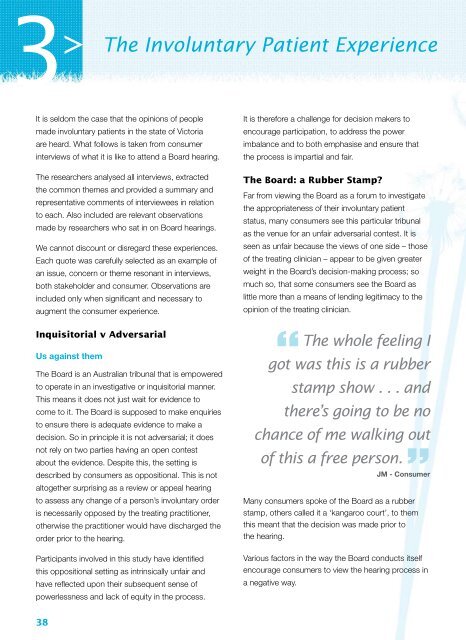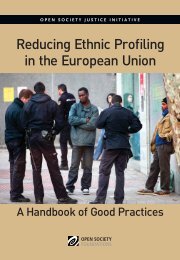Lacking Insight - Community Law
Lacking Insight - Community Law
Lacking Insight - Community Law
- No tags were found...
Create successful ePaper yourself
Turn your PDF publications into a flip-book with our unique Google optimized e-Paper software.
3 > The Involuntary Patient ExperienceIt is seldom the case that the opinions of peoplemade involuntary patients in the state of Victoriaare heard. What follows is taken from consumerinterviews of what it is like to attend a Board hearing.The researchers analysed all interviews, extractedthe common themes and provided a summary andrepresentative comments of interviewees in relationto each. Also included are relevant observationsmade by researchers who sat in on Board hearings.We cannot discount or disregard these experiences.Each quote was carefully selected as an example ofan issue, concern or theme resonant in interviews,both stakeholder and consumer. Observations areincluded only when significant and necessary toaugment the consumer experience.Inquisitorial v AdversarialUs against themThe Board is an Australian tribunal that is empoweredto operate in an investigative or inquisitorial manner.This means it does not just wait for evidence tocome to it. The Board is supposed to make enquiriesto ensure there is adequate evidence to make adecision. So in principle it is not adversarial; it doesnot rely on two parties having an open contestabout the evidence. Despite this, the setting isdescribed by consumers as oppositional. This is notaltogether surprising as a review or appeal hearingto assess any change of a person’s involuntary orderis necessarily opposed by the treating practitioner,otherwise the practitioner would have discharged theorder prior to the hearing.Participants involved in this study have identifiedthis oppositional setting as intrinsically unfair andhave reflected upon their subsequent sense ofpowerlessness and lack of equity in the process.It is therefore a challenge for decision makers toencourage participation, to address the powerimbalance and to both emphasise and ensure thatthe process is impartial and fair.The Board: a Rubber Stamp?Far from viewing the Board as a forum to investigatethe appropriateness of their involuntary patientstatus, many consumers see this particular tribunalas the venue for an unfair adversarial contest. It isseen as unfair because the views of one side – thoseof the treating clinician – appear to be given greaterweight in the Board’s decision-making process; somuch so, that some consumers see the Board aslittle more than a means of lending legitimacy to theopinion of the treating clinician.“The whole feeling Igot was this is a rubberstamp show . . . andthere’s going to be nochance of me walking outof this a free person.”JM - ConsumerMany consumers spoke of the Board as a rubberstamp, others called it a ‘kangaroo court’, to themthis meant that the decision was made prior tothe hearing.Various factors in the way the Board conducts itselfencourage consumers to view the hearing process ina negative way.38
















